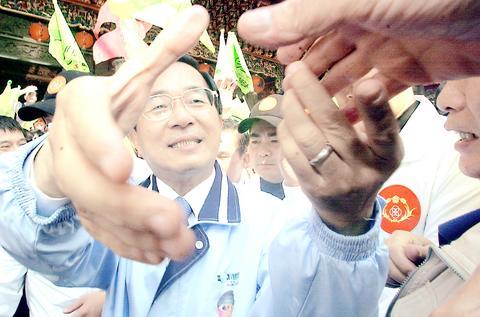President Chen Shui-bian (
"It is an act of selfishness that Lien Chan said he would not pick up his referendum ballots yet at the same time asks others to vote for him [in the presidential election]," Chen said.
During Saturday's election debate, Lien, representing the KMT-People First Party (PFP) alliance in the presidential race, said that while he respected others' decision on whether to cast ballots, he would not be voting in the March 20 referendum, calling it illegal.

PHOTO: LUO PEI-TEH, TAIPEI TIMES
"What is an illegal referendum? Who has the right to call it an illegal referendum?" Chen asked. "Whether a referendum is legal should be left for the grand justices to decide."
"You [Lien] cannot claim yourself a judge and declare that something is illegal," Chen said.
Chen said the people of Taiwan should support the March 20 referendum in order to score a victory for the country.
"It would be a victory for China's Communist Party if the referendum fails," he said.
Chen also criticized the system endorsed by the KMT-PFP alliance of granting 18 percent interest rates to retired military personnel, civil servants and teachers.
"Why does Lien favor the 18 percent interest rate? Because he, as a former vice president, is the recipient of an 18 percent interest rate," Chen said at a meeting with labor union supporters in Taipei yesterday.
"[With the preferential rate] Lien gets a monthly income of approximately NT$400,000, which is more than [the monthly income] of Vice President Annette Lu (呂秀蓮)," Chen said.
Meanwhile, Lien, branding Chen as capricious, said yesterday that more rounds of debate would be like "a bad drama that just doesn't know when to end."
At the end of Saturday's debate, Chen invited Lien to participate in another two debates. Lien then shied away from giving a definite answer.
Citing a poll that said 54 percent of respondents thought there was no need to have further debate, Lien said, "It is hard to focus on issues while debating with Chen because Chen is so inconsistent. I don't see the need to carry on a bad drama."
While the pan-blue camp's big boss declined more debate with Chen, Lien's campaign aides said yesterday that they would visit the Democratic Progressive Party (DPP) today and request a debate between the two camps' youth departments on enlistment.
During Saturday's debate, Lien proposed that young people perform only three months of national service and that the country abandon conscription.
Chen, pointing out that Lien's son has not done his military service, said conscription cannot be scrapped just because certain individuals do not want to do their military service.
Meanwhile, polls showed Chen and Lien were still neck and neck after Saturday's debate.
A poll conducted by the Chinese-language China Times indicated that 37 percent of viewers felt that Chen was more eloquent and quick-witted than his opponent, who received an approval rate of 28 percent.
A survey by the United Daily News suggested that 39 percent of viewers favored Lien's performance, while 38 percent thought Chen was a better debater.

DAREDEVIL: Honnold said it had always been a dream of his to climb Taipei 101, while a Netflix producer said the skyscraper was ‘a real icon of this country’ US climber Alex Honnold yesterday took on Taiwan’s tallest building, becoming the first person to scale Taipei 101 without a rope, harness or safety net. Hundreds of spectators gathered at the base of the 101-story skyscraper to watch Honnold, 40, embark on his daredevil feat, which was also broadcast live on Netflix. Dressed in a red T-shirt and yellow custom-made climbing shoes, Honnold swiftly moved up the southeast face of the glass and steel building. At one point, he stepped onto a platform midway up to wave down at fans and onlookers who were taking photos. People watching from inside

A Vietnamese migrant worker yesterday won NT$12 million (US$379,627) on a Lunar New Year scratch card in Kaohsiung as part of Taiwan Lottery Co’s (台灣彩券) “NT$12 Million Grand Fortune” (1200萬大吉利) game. The man was the first top-prize winner of the new game launched on Jan. 6 to mark the Lunar New Year. Three Vietnamese migrant workers visited a Taiwan Lottery shop on Xinyue Street in Kaohsiung’s Gangshan District (崗山), a store representative said. The player bought multiple tickets and, after winning nothing, held the final lottery ticket in one hand and rubbed the store’s statue of the Maitreya Buddha’s belly with the other,

‘NATO-PLUS’: ‘Our strategic partners in the Indo-Pacific are facing increasing aggression by the Chinese Communist Party,’ US Representative Rob Wittman said The US House of Representatives on Monday released its version of the Consolidated Appropriations Act, which includes US$1.15 billion to support security cooperation with Taiwan. The omnibus act, covering US$1.2 trillion of spending, allocates US$1 billion for the Taiwan Security Cooperation Initiative, as well as US$150 million for the replacement of defense articles and reimbursement of defense services provided to Taiwan. The fund allocations were based on the US National Defense Authorization Act for fiscal 2026 that was passed by the US Congress last month and authorized up to US$1 billion to the US Defense Security Cooperation Agency in support of the

HIGH-TECH DEAL: Chipmakers that expand in the US would be able to import up to 2.5 times their new capacity with no extra tariffs during an approved construction period Taiwan aims to build a “democratic” high-tech supply chain with the US and form a strategic artificial intelligence (AI) partnership under the new tariffs deal it sealed with Washington last week, Taipei’s top negotiator in the talks said yesterday. US President Donald Trump has pushed Taiwan, a major producer of semiconductors which runs a large trade surplus with the US, to invest more in the US, specifically in chips that power AI. Under the terms of the long-negotiated deal, chipmakers such as Taiwan Semiconductor Manufacturing Co (TSMC, 台積電) that expand US production would incur a lower tariff on semiconductors or related manufacturing